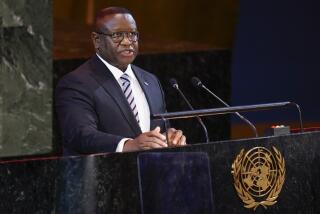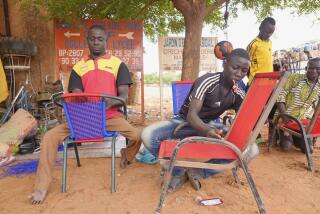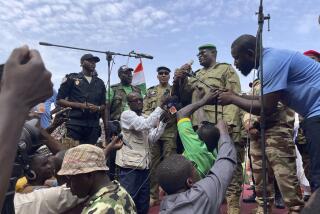Tensions Ease in Sierra Leone’s Capital
- Share via
FREETOWN, Sierra Leone — An uneasy calm and cautious confidence settled over this steamy capital Saturday as government forces launched a counterattack against rebels who have been trying to restart the country’s civil war, while British troops continued to consolidate strategic positions around the city.
The loyalist soldiers rebuffed the rebels of the Revolutionary United Front about 45 miles outside Freetown after the positions of the government forces had been attacked.
Meanwhile, officials in the tiny West African nation announced that the missing leader of the rebels, Foday Sankoh, had been planning to stage a violent coup before the current crisis began.
United Nations officials, military personnel and city residents confirmed that the tension and urgency that had characterized the two weeks since violence erupted here had greatly diminished.
“The situation has stabilized enormously,” said Maj. Andrew Charlton, a commanding officer in the British army. “People are going back to their routine, and they feel more confident.”
Charlton said his company’s main mission, to secure the city’s strategic peninsula for the evacuation of foreign civilians, was proving successful.
In addition, six warships from Britain’s Royal Navy, carrying about 600 marines and 13 Harrier fighter jets, were expected to arrive in Freetown over the weekend to bolster the 700 British paratroops already here.
British forces have played an increasingly influential role in organizing operations on the ground in Sierra Leone. They have set up a base camp at the Bintumani Hotel, once considered among Africa’s most luxurious and efficient hotel and conference centers. Now, it is a bombed-out and dilapidated concrete shell.
Charlton also noted that his troops would help “to restore the U.N.’s capability to restore its mandate.”
Military observers in Freetown said there already were signs that the 9,000-strong U.N. peacekeeping mission--called UNAMSIL--was regaining its bearings after a series of setbacks, including the capture by rebels of several hundred of its soldiers and the death of at least one.
The U.N. troops have a visible presence around the city, staffing roadblocks and conducting foot patrols. Civilians weave comfortably through groups of soldiers on the streets, continuing to hustle and hawk their wares.
“People are feeling much more confident on the peninsula, and the fear of the invasion by the rebels is now much less,” said Julie Thoulouzan, a Freetown-based program officer for the U.N. World Food Program.
Many residents said they were grateful that the U.N. peacekeepers had come to help try to restore stability to their war-weary land. But they feared that the soldiers lacked the capability to deal with the rebels.
“They are good, but they are strangers here,” said Sulaiman Jalloh, a 36-year-old driver. “When they are attacked, they are afraid to shoot back. They don’t know the ground, so they don’t know where to run and hide.”
Indeed, hundreds of UNAMSIL troops remained behind rebel lines Saturday, either cut off or held hostage by the ragtag rebel army.
Of added concern to the Sierra Leonean government and U.N. peace monitors here is the seeming disappearance of Sankoh. The rebel leader was last seen at his Freetown residence Monday when his bodyguards opened fire on thousands of peace protesters who tried to force their way into the compound.
At least 19 people were killed in the shooting. Rival forces then stormed and ransacked Sankoh’s home. Government investigators claimed Saturday to have unearthed documents confirming that Sankoh had been planning to overthrow the regime of President Ahmad Tejan Kabbah.
Officials here also accused Sankoh, a former army corporal and television cameraman, of using his position as chairman of the country’s mining commission to strike illegal diamond deals and then use the proceeds to buy arms for his fighters. The investigators also said they had uncovered evidence that Sankoh had encouraged his followers to abduct and train child soldiers during the country’s eight-year war.
Sankoh, who took up arms in 1991, was sentenced to death in 1998 for treason. His fighters brutalized civilians at the height of the war, committing some of the vilest atrocities of modern-day conflicts. But under the peace accord, the rebels were granted amnesty as well as high-ranking government positions.
Undisciplined, often high on drugs and reportedly armed with a variety of automatic weapons and heavy artillery--as well as armored personnel carriers confiscated from their U.N. hostages--the 15,000 or so rebels could still pose a threat, military observers warned Saturday. The observers cautioned Freetown residents against letting down their guard.
“They are capable of launching attacks still,” said Charlton, the British army major, “and we are maintaining a posture to counter them.”
More to Read
Sign up for Essential California
The most important California stories and recommendations in your inbox every morning.
You may occasionally receive promotional content from the Los Angeles Times.














